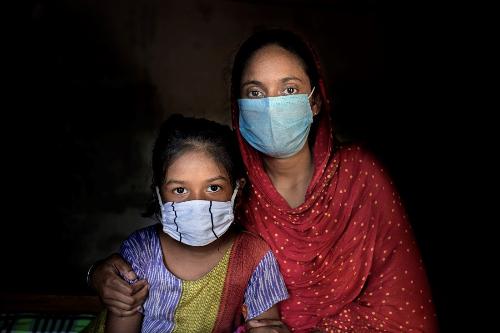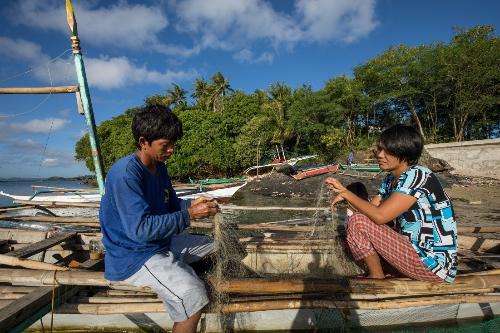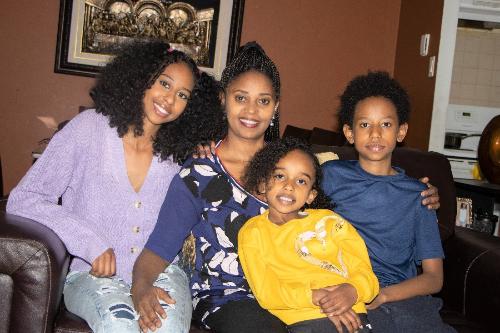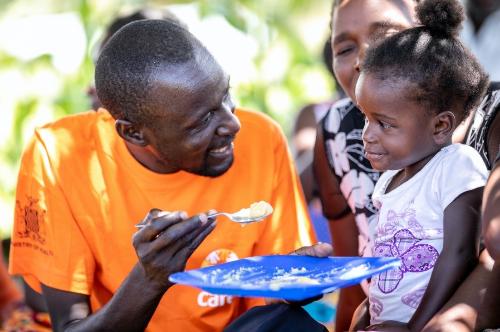Changing the balance for women in the care economy

Caring for home and family is a responsibility disproportionately borne by many Canadian women, leading to stress and economic disparity that have been made worse during the COVID-19 pandemic.
In low- and middle-income countries, the unequal share of unpaid and paid care work shouldered by women—and its consequences—are even more dramatic. Aggravated by the COVID-19 crisis, this imbalance threatens to halt or roll back hard-fought social and economic progress that women have made in the developing world.

Photo Credit: Fabeha Monir / Oxfam
Canada is focusing on this issue at home by taking steps to remove barriers related to care that prevent women from participating fully in the workforce. For example, a Canada-wide early-learning and child-care system will ensure that all families have access to high-quality, affordable, flexible and inclusive early learning and child care, no matter where they live.
To address inequalities internationally, care-related programming supported by Canada aims to improve the ability of women to be part of the economy, education and public life.

Photo Credit: Vu Ngoc Dung / CARE - 2021
Caregiving is essential for human well-being and sustainable economic growth, but it is often highly gendered, overlooked and undervalued. According to the International Labour Organization (ILO), 16.4 billion hours a day are spent in unpaid care work. This is the equivalent of US$11 trillion or 9% of global GDP—twice as much as GDP for the worldwide agricultural sector.
ILO data shows that, globally, women 15 and older spend on average 3.2 times more than men on household tasks, and as much as 4.7 times more in some regions. This restricts the opportunities that women and girls have for education, employment, political and social engagement as well as leisure. It affects their health and deepens their vulnerability to poverty.
Women are also disproportionately represented in the paid care economy, which is characterized by low pay, low status, poor working conditions and limited social protections. ILO data shows that 19.3% of women’s employment globally is in the paid care workforce. This includes more than 75 million domestic workers, over three-quarters of whom are women. Four-fifths of these jobs are in informal employment and are particularly vulnerable to exploitation.

Photo Credit: Frank Spangler
The challenges associated with unpaid and paid care work are heightened in fragile contexts and during periods of crisis. The COVID-19 pandemic has exposed the essential nature of care work and exacerbated the gender inequality that goes along with it. School and child-care centre closures, family illness and overwhelmed health services have escalated the unpaid and paid care work pressure on women and girls.
The global policy agenda has begun to recognize the pressing need to address this issue. Canada supports programming that targets the caregiving imbalance for women around the world. This approach is founded on a Feminist International Assistance Policy, which recognizes that advancing gender equality and the empowerment of women and girls is the best way to build a more peaceful, inclusive and prosperous world.

Photo Credit: Michael Kirkby
Some examples of global projects supported by 抖淫视频 shows how investing in the care economy helps women and girls succeed:
- Projects implemented by CARE Canada are helping to right the imbalance in the division of labour in households. These are efforts aimed at improving the health and nutrition of women and girls in southern Africa and enhancing the economic well-being of ethnic-minority women living in poor and rural northern Vietnam. Project goals include getting men to take on caregiving responsibilities and allowing women to assume decision-making power in the household and the public sphere.
- ADRA Canada projects designed to help people lift themselves out of poverty first focus on ensuring a fair distribution of unpaid care work. Engaging men and boys in caregiving has led to lasting behavioural change in initiatives to reduce maternal and child mortality in remote areas of Cambodia, Myanmar, the Philippines and Rwanda. In South Sudan, making water, sanitation and hygiene facilities more available is improving life and creating opportunities for women and girls, who are largely responsible for household tasks.
- In Bangladesh, an Oxfam Canada project is raising awareness of the need to improve conditions for some 10.5 million paid domestic workers in the country. Most are women who earn just $15 a month and are often mistreated, especially in the context of the COVID-19 pandemic. Securing their right to negotiate fair wages and working conditions will have a positive impact on these care workers and the country’s economy, which is highly dependent on their household labour

Photo Credit: Karin Shermbrucker/CARE
Through their focus on unpaid and paid care work, these projects will improve the lives and livelihoods of women and girls, transforming communities and presenting a model for others to follow.
To further move the needle on this crucial issue, Prime Minister Justin Trudeau at the Generation Equality Forum in June 2021 that Canada would commit $100 million in new funding for stand-alone programming to address issues in unpaid and paid care work in low- and middle-income countries in which Canada provides international assistance.
- Date modified: